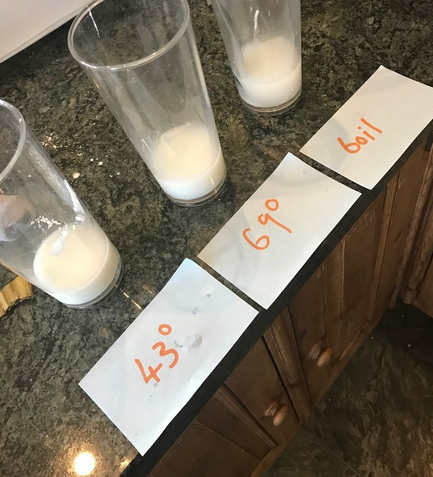Cookery Course Progress.
After Christmas I restarted Science & Cooking: From Haute Cuisine to Soft Matter Science (chemistry), which is free on the internet. I’m really enjoying it and I was sad that I didn’t complete it the first time.
In any case, I’ve been getting more out of this time, partly because I’ve kept up my habit of looking up the science behind foods, or listening to the Cooking Issues Podcast so I’m a little bit more ready for the content.
I’m about half way though, and I’m hoping to complete this course by the end of Jan (edit: actually done on the 2nd February). There are two more courses after that - one on the Physics aspects (which I expect to be a bit easier because I’m better at Physics than Chemistry) and one on Fermentation (which I expect to be much harder but also more worthwhile because my biology is truly terrible). I’m going to leave a bit of a gap before moving on to the next course: I’d like to actually try out some of the dishes, do more experiments at home, read around the topic a little more.
It’s hard for me to express how much I’m enjoying it - my cookery and my chemistry were both things that I was a little embarrassed by how little I knew and it was wonderful to find a course of exactly the right level and content. I’m entertaining daydreams of taking a month off at some point and interning in a Serious Restaurant (which I would doubtless quit after two shifts of more work than I’ve ever done in my life but daydreams are daydreams).
For completeness, here’s some books I’ve been getting a lot out of:
- McGee on Food and Cooking
- Science and Cooking, which I reviewed below (if the embed works)
- The Science of Spice a distant third place, but at least is in the right space. (I get that ‘spice’ is literally in the title, but it suffers from a lack of herbs)
I’ve also been doing any amount of my own playing :)

One thing that has been really interesting: the course involves a lot of science and numbers, and shapes of molecules and references. It also includes a lot of recipes. However, I’m yet to reach the point were I can reasonably commit large sections to memory. There’s lots of reasons for this:
- The more I understand, the less there is to memorise - so there is a disadvantage to committing a recipe to memory now.
- I’m not quite sure how everything fits together and I don’t want to structure things in my head.
- I’m yet to cook enough to know what information would be useful on a day-to-day basis.
Obviously some of it will be useful - having to look something up while your hands are covered in gluten is a pain, but I’m not there yet. I’ve got an ambition to properly review the experience for a future second edition of Advanced Memory Palaces after I do all the courses but that will be a long time coming.
 Science and Cooking: Physics Meets Food, From Homemade to Haute Cuisine by Michael P. Brenner
Science and Cooking: Physics Meets Food, From Homemade to Haute Cuisine by Michael P. Brenner
My rating: 5 of 5 stars
So. It’s excellent. That’s the first thing. It’s absolutely great.
It’s written as a result of a popular course (that I’m taking) the authors teach online. That caused some disappointment: I’m used to the idea that the textbook is a much deeper dive into the topic than the course but in this case this feels like a cross between a light overview and a transcript of parts of the lectures with some interesting recipes added for bulk. The ‘course companion’ previously released on kindle is much more scientific.
I learned a lot and I also think this is a book that helps move the world of cookery books from ‘Christmas gifts that are glanced at and left on the shelf’ to ‘genuinely interesting books that you can read cover to covet and also make recipes from’.